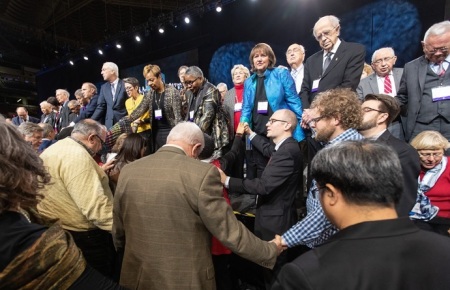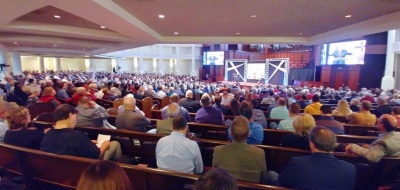Conservative United Methodist group endorses 'amicable separation' over LGBT debate

A theologically conservative group has endorsed a plan for “amicable separation” for The United Methodist Church due to the denomination’s ongoing debate over LGBT issues.
Over the past several years, the UMC has experienced increasingly divisive debates over the church body’s official stance against homosexuality, gay marriage, and the ordination of noncelibate homosexual clergy.
The Wesleyan Covenant Association released a statement last Thursday expressing their leadership’s support for the Indianapolis Plan for Amicable Separation, a proposal that will be considered at the UMC General Conference next year.
The Rev. Jeff Greenway, chairman of the WCA Council, said in a statement that the council vote in favor of the Indianapolis Plan came after considerable debate.
“It was at times a tense debate for the council, but always a respectful one,” explained Greenway. “All the members of our council, both laity and clergy, have given years of service to The United Methodist Church; they have faithfully supported it with their talents, their time, and their service.”
“So it was obviously a very hard and painful decision to conclude some form of separation is the only viable way forward given the great impasse that threatens the denomination and its local churches.”
The Indianapolis Plan was created over the summer through meetings of a 12-person group of United Methodist leaders, including centrists, progressives and conservatives.
Named for the city in which the group met, the plan calls for the creation of a Traditionalist denomination, a Centrist denomination, and possibly a Progressive denomination.

The “Indy Plan” is not without its critics. The Rev. Sky McCracken, senior pastor of First United Methodist Church in Jackson, Tennessee, argued that the plan is flawed in that it assumes “that local congregations, and even ‘affinity groups,’ are even close to being monolithic.”
“Splitting the UMC into two groups of ‘Traditional’ and ‘Centrist/Progressive’ is a pretty broad paint stroke of assumption – some would say naive, others would say manipulative,” he wrote in a Facebook post republished by United Methodist Insight in August.
“What do those words even mean? It sounds akin to when politicians label the ‘other’ whatever derogatory term is en vogue to curry votes. I would think the Church would want to use a different approach than parroting our politicians.”
The Indianapolis Plan is not the only proposal that the 2020 General Conference will consider that advocates amicable separation as a way to end the denomination’s debate on LGBT issues.
The theologically progressive UM-Forward submitted a proposal known as the New Expressions Worldwide Plan, which if implemented would create four different Methodist denominations: a “Traditionalist Methodist Church,” a “Moderate Methodist Church,” a “Progressive Methodist Church,” and a “Liberation Methodist Church.”
“These new expressions will share a common heritage, grounded in the Wesleyan view of grace and holiness, commitment to mission, and connectionalism. However, each denomination will have a different understanding of how this heritage faithfully ‘serves the present age,’” states the NEW Plan.
“True to the covenant prayer of the Wesleys, we yield our allegiance to a single denomination for the sake of faithful employment to the gospel of Jesus Christ, and reimagine our future ministries and missions.”






















